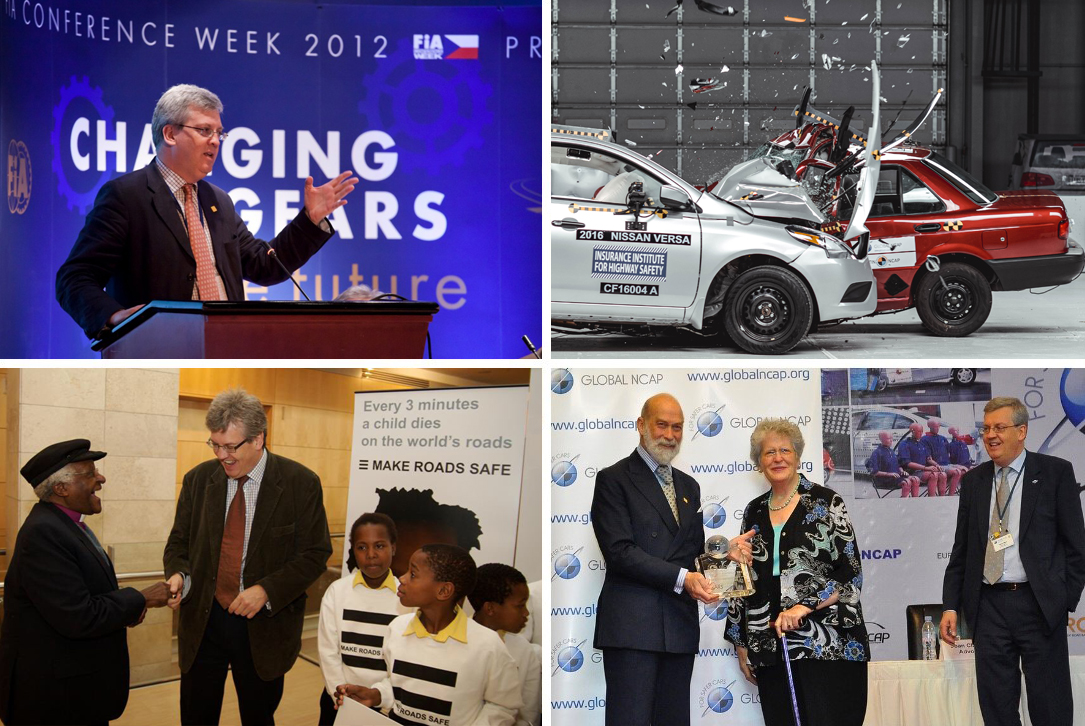Twenty years ago I had the huge privilege to lead the creation of the FIA Foundation. This was possible thanks to an act of great foresight and generosity by the Federation Internationale de l’Automobile (FIA) led by its President, the late Max Mosley. He persuaded the Federation that the proceeds from the lease sale of its commercial rights to Formula One should be used to permanently endow a new charity dedicated to road safety, sustainable transport, and motor sport safety. This exciting task fell to me to establish the Foundation as a UK registered charity with a Board of Trustees mainly drawn from FIA clubs and chaired by the then President of the Italian Automobile Club Avvocato Rosario Alessi.
It is a rare opportunity to be able to build a major new philanthropy with significant resources. And we were fortunate to be able to act quickly in serving as a global catalyst for change. The launch of the Foundation came just one year after the United Nations (UN) had adopted the Millennium Development Goals (MDGs). But unfortunately the MDGs had completely overlooked the rising tide of road traffic injuries, 90% of which were occurring in low and middle income countries. The FIA Foundation was ideally placed to tackle this serious omission and we began working with the World Health Organization (WHO) to ensure that road safety gained the global recognition it deserved.
Contributing $1 million annually to the WHO’s Five Year Road Safety Strategy, we were able to boost international awareness about their alarming forecasts of a potential surge in levels of road trauma. We also hosted the then WHO Director General Gro Harlem Bruntland at a major conference in London in 2003 where she dedicated World Health Day that year to road safety. In parallel the UN General Assembly, on the initiative of the Sultanate of Oman, held a first ever debate on road safety and this led to the creation of the UN Road Safety Collaboration which, to this day serves, as the main coordination mechanism for UN activities in road injury prevention.
Having gained a place on the foothills of the global health and development agenda, the Foundation then set about climbing higher. We played a key role in the creation of the World Bank’s Global Road Safety Facility with a $5 million grant designed to stimulate other donors to invest. And in 2006 we launched the Commission for Global Road Safety under the patronage of Prince Michael of Kent and the Chairmanship of Lord Robertson of Port Ellen. The Commission began to publish a series of ‘Make Roads Safe’ reports that called for a first global Ministerial Conference on road safety, a UN Decade of Action, the creation of a UN Special Envoy for Road Safety, and inclusion of road injury in the Sustainable Development Goals (SDGs) that succeeded the MDGs after 2015. All our advocacy targets were achieved; with the first Ministerial Conference held in Moscow in 2009, the first Decade of Action launched in 2011, Jean Todt, Max Mosley’s successor as FIA President, appointed as the UN Secretary General’s Special Envoy, and road safety included in the SDGs launched in 2016.
Alongside these advocacy campaigns we also supported direct interventions in key pillars of road injury prevention. The Foundation helped to establish the Global New Car Assessment Programme and the International Road Assessment Programme which are working to transform the safety of vehicles and roads. And we tackled the broader agenda of sustainable transport and environmental protection. The Foundation supported UNEP’s Partnership for Clean Fuels and Vehicles and launched the Global Fuel Economy Initiative. And, of course, in recognition of the origins of our endowment we helped to establish the FIA Institute for Motor Sport Safety and contributed resources to key areas of safety research and training. My successor at the FIA Foundation, Saul Billingsley has sustained these efforts superbly and also succeeded in bringing a much needed focus on risks to child health caused both by road injury and air pollution.
Reflecting on the Foundation’s first twenty years, I think the extraordinary act of philanthropy made by the FIA has been both hugely influential and beneficial. The Federation and its member clubs can be justifiably proud of what has been achieved. For it is fair to credit the FIA Foundation with playing a leading role in transforming global road safety. The WHO’s initial forecasts of soaring road deaths have not happened and the first UN Decade of Action has seen fatality rates stabilize. Of course, 1.3 million people being killed annually on the world’s roads is entirely unacceptable and that is why we need to redouble our efforts in a new Decade of Action to at least half road deaths and serious injuries. By 2030 also we need also to take decisive steps towards decarbonizing road transport to prevent damaging climate change, and stronger action to improve air quality. The transformation of our transport systems to make them safer and cleaner than ever before is the urgent task of the next ten years. Whilst the global agenda certainly does not get any easier, it is reassuring that, after twenty years of solid achievement, the FIA Foundation is still fulfilling its original mandate as an independent champion of safe and sustainable transport. Given the challenges we face in the decades ahead it’s influence and commitment will be needed more than ever before.

